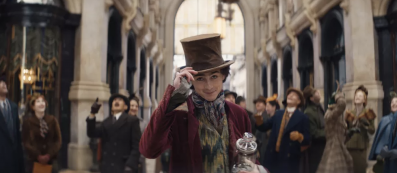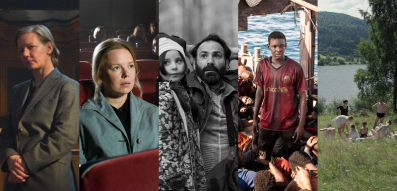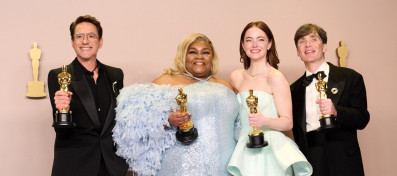Tonkatsu DJ Age-Taro - Weird, delightful comedy about music and the memories of city from Japan
Ludicurous chemistry between pork cutlet and DJ culture in Japan has produced an unexpected cinematic delight.
Have you ever heard of a Japanese dish called tonkatsu? It is a very popular dish in Japan, in which pork is fried with bread crumbs. There are even restaurants that specialize in it. But who would have thought that someone would fuse tonkatsu, the Japanese national dish, with illuminative nightclub culture to create a manga, and that someone could make a movie out of that manga. Tonkatsu DJ Age-Taro (とんかつDJアゲ太郎, literally translated "Age-Taro, the Pork Cutlet DJ") directed by Ken Ninomiya is one such film, and the ludicurously devilish chemistry between tonkatsu and DJ has produced a completely unexpected and rare cinematic delight.
The protagonist of this film is a young man named Agetaro (Takumi Kitamura). He works in a tonkatsu restaurant where his father, Agesaku (Brother Tom) runs, but Agetaro is fed up with the fact that he is always being forced to cut cabbage and not being able to fry tonkatsu. However, when he goes to a club called Womb to deliver a bentou, he witnesses the exquisite finesse by a professional DJ named DJ Oily (Iseya Yusuke) which makes people rupturous, and Agetaro's life changes drastically.
Symbolized by its setup, this film expands as a weird, offbeat comedy. Agetaro decides to become a DJ, starting his action with his four bad friends, but their project "Tonkatsu DJ" is so damb that it makes a buzz on Youtube, and unpredictably Agetaro becomes Japan's golden boy. However, he gets into a slump after being told by his love interest, Sonoko (Maika Yamamoto), that she can't understand it, with some kind of contempt. But DJ Oily appears in front of Agetaro suddenly, so he becomes Oily's disciple, trying to open a path to professional DJ.
The original of this film is a manga by Lipyao and Yujiro Koyama that was published in the weekly online magazine "Shounen Jump+", and it belongs to the genre so-called "shonen manga / 少年漫画" like Dragon Ball, NARUTO, and Kimetsu no yaiba. This genre is based on the classic values "Friendship, Hard Work, and Victory!" (友情・努力・勝利), and the story of this work is based on this value. With the help of friends and the battle with rivals, Agetaro never stops trying to become a DJ, sometimes failing drastically, but in the end.....
However, the quality of the film is not that great. In the original manga, there are aberrant ridiculousness and inevitable persuasiveness of the combination of pork cutlet and DJ culture, but the script written by the director Ninomiya makes them mild, so the film lacks a penetrating sense of humor, which also stagnates the flow of the story. Its cinematography by Tetsuya Kudo is somehow tasteless as there is no dynamism in the picture.
Nevertheless, I love this film for a certain reason, perhaps in a way even the director didn't intend to do. At the beginning of the film, the cityscape of Shibuya in Tokyo comes to life with Incredible Bongo Band's Apache and its sophisticated sounds of funk music. Shibuya 109, an intersection filled with young people, a love hotel district full of bleakness, and the figure of a now-closed Korean restaurant Samugori. As I looked at these scenes, trapped in the word "nostalgic" after the coronavirus disaster, I thought about the memory in my film experience; there is a flash of Blaxsploitation film in this film.
Blacksploitation is a crime or action film genre that emerged in the United States in the early 1970s, which features Black actors with abundant Black culture like soundtrack of soul or funk music. Some of the best-known films include Shaft and Coffey, the latter of which was the inspiration for Quentin Tarantino's Jackie Brown. But Tonkatsu DJ Age-Taro doesn't have the sophisticated violence of Coffey or the exhilarating struggle of desire in Across 110th Street and it doesn't have a Black actor from the first place.
But even if they weren't great in terms of quality, Blaxploitation films that I couldn't stop loving shine as a film about the memories of a city through music. The uplifting beats of funk and soul, played by, for example, Bobby Womack or Curtis Mayfield, took me to the places like New York City's Harlem and Cleveland, the places having an obscene yet rich culture. In George Armitage's Hit-man a stylish assassin's careens through Los Angeles. In Top of the Heap by Christopher St. John, the protagonist's anguish as a police overlaps sorrowfully the landscapes of Washington, D.C. By watching these lovable films, I was able to travel through a world that I've never known because I live in Japan, or the memories of a city that only the people living there possess.
Tonkatsu DJ Age-Taro invites the audience into the memories of Shibuya through diverse glares of music. We will witness the kaleidoscopic cityscapes of Shibuya in the midst of Agetarou's struggles. A club enveloped in iridescence and zenith, a crowded area in front of Hachiko statue, the building of video rental stor namede TSUTAYA (Yeah, there are still Blockbuster in Japan!) and a residential area full of Japanese-style houses away from the downtown area. In such landscapes between memories and music, I saw the soul of Blaxsploitation.
By the way, this film is badly received by the people who frequently go to the club. Part of the reason for this is the old music. They say that there's no way the floor is heating up by The Knack's My Sharona or Jackson Sisters' I Believe in Miracles in the 2010s. Perhaps this is closely related to why I was stimulated to think about Blaxploitation for this film. The genre was born and disappeared in the 70's, and it's a kind of nostalgia to remember about this genre when watching a contemporary film. In other words, Tonkatsu DJ Age-Taro is a sweet nostalgia itself. That's why it strikes a chord with a certain number of people, including me.
But does it mean that Tonkatsu DJ Age-Taro is just an old-fashioned movie? No, I want to say that Tonkatsu DJ Age-Taro is an utterly vivacious film that tells a love for the Shibuya city, with the dextrous combination of a purely Japanese narrative, and an American-style visionary spectacle, by putting tonkatsu, DJ and nostalgia at its centor. And in this corona calamity, it is a heartbreakingly dazzling film. I can't call it a masterpiece by any means, but I love this noble soul deeply, so deeply.














